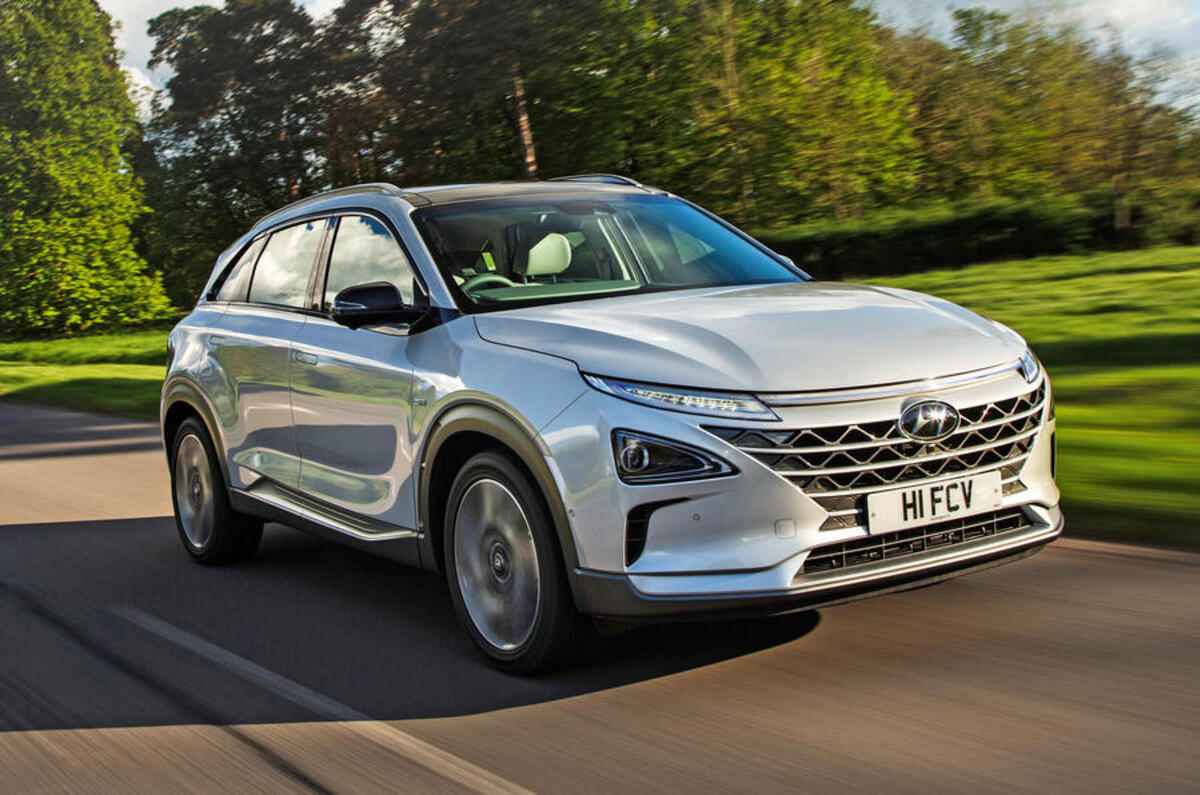Hyundai Nexo sales are being held back by limited production capacity, but still growing exponentially according to the firm’s hydrogen fuel cell business head Dr Sae-Hoon Kim.
The Nexo, the firm’s second-generation production fuel cell passenger car, was launched last year, with plans to sell around 1500 cars in 2019. However, in Korea alone 5500 cars have been ordered, meaning supply has been cut off for potential US and European buyers.
“We have to do what makes most business sense, and with good subsidies available in Korea that could be cut off at any time the decision was made to fulfill those orders,” said Kim. “We are doing our best to meet demand but it keeps on growing.”
As a result Hyundai has invested in upping its production capacity of fuel cell vehicles to 40,000 per year, on a par with Toyota’s current projections. While these figures remain tiny in global car production terms, and even compared to battery-electric production numbers, Kim says that it brings production ever-closer to a point that it is commercially viable.
“At around 200,000 units a year you get the scale to buy the materials you need at a cost that could put a hydrogen car on a cost par with today’s battery-electric vehicles,” he said. “At the current rate of demand I can see that happening within five years.”
Kim also highlighted Hyundai’s recent work in developing fuel cell technology for commercial vehicles as a priority for advancing the uptake of hydrogen, saying: “The key is that you need 5-10 times more durability than for a passenger car, around one million kilometres,” he said.
“We can see today how we get to 500,000km in two to three years, and from there it is possible to take the next steps with the stack design I believe. These improvements don’t necessarily add cost - if you improve technology, sometimes it can reduce costs.”
Read more:
Audi renews hydrogen powertrain development scheme
Under the skin: why hydrogen could be an easy cell
Autocar Awards 2019: the winners




Join the debate
Add your comment
This maybe obsolete dribble but. .
Pipe dream and still probably very ££££, it's just an observation. :)
For me Hydrogen makes more sense than BEVs long term. Yes it's a volatile substance but so is Petrol and LPG...just needs the rigour of saftey.
Hydrogen tanks in cars can be made safe.....we manage it on some cars these days not to mention the companies who supply armoured vehicles.
Running the production plants on green electric , easy ....they could just use , ermm ... Hydrogen ???
What to do with all the gas emissions that are produced ....now that's where they can look at carbon capture schemes as the power industry is doing .
Basically it's gonna cost a shed load and I guess no-one company wants to foot the bill on their own or without a good strong partnership with others working on standardising the systems and infrastructure.
You know ? What they should be doing with charging stations?
I am open minded about
I am open minded about hydrogen. It makes far more sense to fuel a car with an easy to make gas or liquid than run around carrying hundred of Kilos of rare earth minerals, but today the costs are too high. To get them down they need scale, so its worth Hyundai, Honda, Toyota etc investing.
The key to hydogen in the UK would be the fuelling infrastructure. We need a manufacturer, or group of them to create this, much like Tesla did with their superchargers, so people can have a Hydrogen car and be confident of refuelling.
If we just back one type of EV, we risk going down the VHS route when Betamax was superior.
But
Building 2 sets of infrastructure (battery charging and hydrogen filling) would cost a great deal and dilute the effort of getting combustion cars off the roads. And who says hydrogen fuel cell cars are lighter than BEV’s? The storage vessel needs to be massively strong and surrounded by extra crash structure. And you still need the weight of the converters and electric motors.
Remember - neither VHS nor Betamax was the answer: it was digital storage.
So one day a new drive system will be developed and it would be better if we only invested in one interim clean energy solution. Batteries. Before long we’ll be charging them so quickly it’ll approach the speed of filling with liquids or gases.
Also
Love the way they say "However, in Korea alone 5,500 cars have been ordered, meaning supply has been cut off for potential US and European buyers." really? They're selling an average of 20 cars a month in the US and 25 in Europe. So these 45 cars will make a difference, lovl!
Still I suppose it sounds better than "we're pulling out of Europe and the States due to very poor sales and losing money hand over fist". Hydrogen goes pop.